Faith and Politics
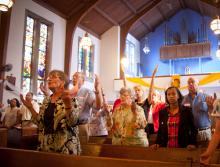
President Obama’s support among Catholic voters has surged since June, according to a new poll, despite a summer that included the Catholic bishops’ religious freedom campaign and the naming of Rep. Paul Ryan, a Catholic, as the GOP's vice-presidential candidate.
On June 17, Obama held a slight edge over Mitt Romney among Catholics (49-47 percent), according to the Pew Research Center. Since then, Obama has surged ahead, and now leads 54-39 percent, according to a Pew poll conducted on Sept. 16.
Among all registered voters, Obama leads Romney 51-42 percent, according to Pew.
Obama and Romney are essentially tied among white Catholics, which some pollsters call the ultimate swing group.
On Sept. 24 Romney unveiled his Catholics for Romney Coalition, which includes numerous politicians, beer magnate Pete Coors and Princeton University intellectual Robert P. George. The Obama campaign also has a Catholic coalition.
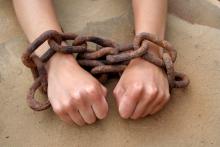
President Obama speaking to the Clinton Global Initiative on Tuesday:
I want to discuss an issue that relates to each of these challenges. It ought to concern every person, because it is a debasement of our common humanity. It ought to concern every community, because it tears at our social fabric. It ought to concern every business, because it distorts markets. It ought to concern every nation, because it endangers public health and fuels violence and organized crime. I’m talking about the injustice, the outrage, of human trafficking, which must be called by its true name — modern slavery.
Now, I do not use that word, "slavery" lightly. It evokes obviously one of the most painful chapters in our nation’s history. But around the world, there’s no denying the awful reality. When a man, desperate for work, finds himself in a factory or on a fishing boat or in a field, working, toiling, for little or no pay, and beaten if he tries to escape — that is slavery. When a woman is locked in a sweatshop, or trapped in a home as a domestic servant, alone and abused and incapable of leaving — that’s slavery.
When a little boy is kidnapped, turned into a child soldier, forced to kill or be killed — that’s slavery. When a little girl is sold by her impoverished family — girls my daughters’ age — runs away from home, or is lured by the false promises of a better life, and then imprisoned in a brothel and tortured if she resists — that’s slavery. It is barbaric, and it is evil, and it has no place in a civilized world.

I was groomed in a Latino home where nail salons were viewed as rites of passage for becoming a senorita — growing young lady. Sometimes when I’m looking for some TLC, I head to my local nail salon in East Harlem. I could go to a more upscale salon, but here at Pretty Nail Salon, is where I want to be — connected to a neighborhood of ladies who have utilized storefront nail salons, beauty parlors, and hair-braiding places as makeshift therapeutic spaces where counsel and support is just as paramount to looking beautiful.
I have also discovered that nail salons are burgeoning places of policy concerns. Pretty Nail Salon has provided me with an informal education on how social policy affects the everyday day lives of working class folks. Our presidential candidates could also benefit from an appointment at Pretty Nail Salon, to listen to the local narratives and deepen their understanding of how social policy is affecting the lives of the urban poor and working class.
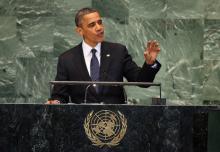
President Obama on Tuesday gave a forceful speech at the United Nations, in which he challenged much of the world's assumptions about free speech and religion.
Here are five points from his address, which together, add up to as close to an Obama Doctrine on Religion as we've seen:
1. Blasphemy must be tolerated, however intolerable
The idea that the U.S. protects even vile speech, so ingrained in American culture, seems counterintuitive to much of the world. It’s an especially tough concept when speech targets a religion, but Obama argued that restrictions on speech too often become weapons to suppress religion – especially the rights of religious minorities.
![The Salt Lake Temple worship site. RNS photo by Carol M. Highsmith [Public domain] via Wikimedia Commons RNS photo by Carol M. Highsmith [Public domain] via Wikimedia Commons](https://sojo.net/files/styles/medium/public/blog/thumbRNS-MORMON-NUMBERS050412a_0.jpg)
A Mormon blogger who has written critical web essays about Mormon history, temple worship and contemporary issues — including about GOP presidential nominee Mitt Romney — is facing church discipline for “apostasy.”
Initially, the Florida blogger, David Twede, managing editor of mormonthink.com, told news media Sept. 21 that the threatened church action was due to his comments about Romney. Later that day, he denied any political link. Then, on Saturday, he returned to “a feeling in (his) gut” that his Romney remarks triggered the possible discipline.
Twede did get a letter from his Mormon leaders in Orlando, summoning him to a disciplinary council Sept. 30 for “apostasy,” which they attributed to Twede’s writings.
In recent days, the blogger has blasted Romney as part of his critique of Mormonism, its beliefs about the nature of God and its temple ceremonies.
But, Twede told The Salt Lake Tribune on Friday, his LDS leaders never brought up Romney, a Mormon, in their exchange with him. Though not supporting the Republican nominee, Twede apologized to Romney, saying, “I didn’t mean for (the story) to go this way.”

Editor's Note: This is the second article in Lisa Sharon Harper’s election season blog series, Watch the Vote. Read the first HERE.
A few folks got a brilliant idea and brought a bunch of organizations together to declare September 25, 2012 as the first ever National Voter Registration Day! Aka, for the Twitterverse, #925NVRD. Woot, woot!
Maybe, like me, you’ve moved since the last election. Or maybe you’ve just turned 18. Or maybe, somehow, you managed to sleep through the last two elections. Don’t know how you did it, and I’m not judging, but brother, son, sister, daughter, today is the day to get right with the Lord. In times like these no one can afford to sit back and watch this one like a reality show on Bravo TV. Exercise your dominion; register to vote today!
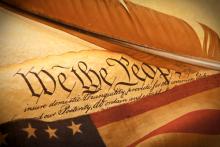
We’ve all heard the rhetoric. “We need to take America back for God!”
Why? Supposedly so we can regain some bygone level of ethics or moral standards. Supposedly, if we don’t, God will get tired of us “rebuking” God and remove God’s hand of protection from us. Supposedly, so God won’t test us or judge us or something.
Yet, as Gregory A. Boyd notes in his important book The Myth of a Christian Nation: How the Quest for Political Power Is Destroying the Church, taking America BACK for God assumes we were at one really belonged to God, followed God, listened to God. Boyd goes on to ask, when was this glorious age in the history of the USA?
Let’s start way back. We’ve been taught that many people migrated to North America for religious freedom. So was this glorious time when some of our forebears imprisoned, tormented, and/or hanged many suspected to be witches? Is that what so many want to take us back to?

Most people, Christian or not, know the story of the Good Samaritan. In it, a man, who is presumably an Israelite, is mugged on the road between Jerusalem and Jericho. A priest passes by without stopping. So does a Levite. But then a Samaritan — someone who belongs to a radically different socioeconomic and cultural group than the Israelite — stops to help. This is Jesus’ vision for us as we answer the question, “Who is my neighbor?”
So it should shock us, surprise us, and sadden us, when we hear about tragedies like the shooting at the Sikh gurudwara in Oak Creek, Wisconsin. For the victims of such attacks — whether they are Sikh, Muslim, Hindu — are our neighbors too.
My friend Mike Gerson wrote a significant column in the Washington Post today, titled "An Ideology Without Promise." It takes a deeper look at the now infamous Romney video and addresses the crisis that we all have to face now. I recommend reading Mike’s column. He says in part:
This crisis has a number of causes, including the collapse of working-class families, the flight of blue-collar jobs and the decay of working-class neighborhoods, which used to offer stronger networks of mentors outside the home. Perverse incentives in some government programs may have contributed to these changes, but this does not mean that shifting incentives can easily undo the damage. Removing a knife from a patient does not automatically return him to health. Whatever the economic and cultural causes, the current problem is dysfunctional institutions, which routinely betray children and young adults. Restoring a semblance of equal opportunity — promoting family commitment, educational attainment and economic advancement — will take tremendous effort and creative policy.

The white working class, a potentially rich bloc of voters for Republicans or Democrats, hasn’t settled on Mitt Romney or President Barack Obama, a new study from the Public Religion Research Institute shows.
“These white working class voters are not particularly enamored of either candidate,” said Daniel Cox, PRRI’s research director. “In terms of their favorability, they’re both under 50 percent.” Forty-four percent look favorably upon Obama and 45 percent upon Romney.
Released seven weeks before the election, the August survey found Romney with a double-digit lead over Obama among the white working class, which preferred the GOP candidate 48 to 35 percent.
But Cox points out that the gap narrows to statistical insignificance among women voters in this group, and in the Midwest and West, home of several swing states. The upshot for Romney and Obama?
If they want to woo this group, which makes up 36 percent of the nation according to the study, the campaigns may want to consider other findings of the PRRI poll.
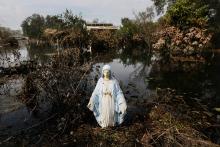
NEW ORLEANS — Faith-based ministries and local charities that are ramping up relief efforts after Hurricane Isaac say it's already clear that recovery will proceed without the national outpouring of money and volunteers triggered by Hurricane Katrina.
"From our point of view, the biggest challenge with this disaster will be getting attention and money," said Gordon Wadge, president of the New Orleans chapter of Catholic Charities.
"This is going to be on the local community — with a few national folks who follow us closely and who will rally to us."
That's a stark contrast to the conditions relief directors saw in 2005, after nationally televised images of human misery from Katrina burned themselves into the national psyche. Within weeks, faith-based ministries and secular relief groups promised to funnel millions of dollars into New Orleans over five years.
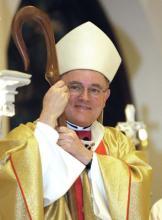
A series of recent developments are renewing questions about the Catholic bishops' alignment with the Republican Party, with much of the attention focusing on comments by Philadelphia Archbishop Charles Chaput, who said he “certainly can’t vote for somebody who’s either pro-choice or pro-abortion.”
In a wide-ranging interview published Sept. 14, Chaput also echoed the views of a number of prominent bishops when he praised Republican vice presidential nominee Paul Ryan for trying to address the “immoral” practice of deficit spending through his libertarian-inflected budget proposals.
"Jesus tells us very clearly that if we don’t help the poor, we’re going to go to hell. Period. There’s just no doubt about it,” Chaput told National Catholic Reporter.
“But Jesus didn’t say the government has to take care of them, or that we have to pay taxes to take care of them. Those are prudential judgments. Anybody who would condemn someone because of their position on taxes is making a leap that I can’t make as a Catholic.”
Chaput stressed that he is a registered independent “because I don’t think the church should be identified with one party or another.” But he said that the Democratic Party’s positions on abortion rights, gay rights, and religious freedom “cause me a great deal of uneasiness.”
He added that economic issues are “prudential judgments” open to a variety of legitimate approaches. Abortion, on the other hand, is “intrinsically evil” and must always be opposed.
That is a talking point voiced by many Catholic conservatives, including Ryan himself. Last Friday, Ryan told the Christian Broadcasting Network that opposition to abortion and same-sex marriage, and support for religious freedom, are all “non-negotiables” for a Catholic politician while “on other issues, of economics and such like that, that’s a matter of prudential judgment.”
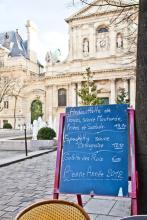
You can tell from its menu whether a restaurant expects to serve tourists, locals or regulars.
At a tourist-centered eatery like those near Times Square, the menu typically is huge: many pages, difficult to scan, sometimes difficult even to hold. There's something for everyone and it's designed to please customers who are strangers.
A restaurant catering to locals will have a much leaner menu, maybe just four or five items in each category. They will all be of a certain type—no words like "Asian fusion" to disguise lack of focus. If the joint is Korean, it will serve Korean.
A third and much rarer type is the restaurant that offers just one multi-course meal each night. Regulars go expecting to be served the chef's whim of the day, not handed a long menu.
When customers are strangers, the owner must imagine what will please a patchwork of German tourists, Chinese tourists, families from Iowa, young techies on the prowl, and marketers in town for a convention.
The better an owner knows the customers, the more focused the menu can be. If not the actual customer, at least the type of person who will come in.
Voting isn't all that different. When politics is local, candidates tend to know their people or at least know their interests, worries and hopes. This is the level at which democracy tends to work best. Leaders know their people, people know their leaders, and known interests are at stake.
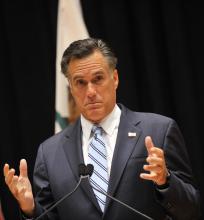
The recently revealed video of Gov. Mitt Romney at a fundraising event last May is changing the election conversation. I hope it does, but at an even deeper level than the responses so far.
There are certainly politics there, some necessary factual corrections, and some very deep ironies. But underneath it all is a fundamental question of what our spiritual obligations to one another and, for me, what Jesus' ethic of how to treat our neighbors means for the common good.
Many are speaking to the political implications of Romney's comments, his response, and what electoral implications all this might have. As a religious leader of a non-profit faith-based organization, I will leave election talk to others.

[Editor's Note: This is the first article in an election season blog series called Watch the Vote.]
In today's hyper-politicized climate, all of the hoo-hah about voter suppression can sound like a bunch of partisan pandering on both sides.
If you're just tuning now, it can easily look like Democrats are whining and crafting conspiracy theories over something that really won't matter in the end, anyway — so why waste your breath?
Or, for the even more cynical, sure, it might matter, but there's nothing we can do about it — so again, why waste our breath?
Here's why. Check this out.

Mitt Romney has an evangelical problem. Or so we’ve been told by everyone from The New Yorker to The Huffington Post to The Daily Beast. The national media have perpetuated this narrative throughout the election season, and political pundits aplenty have assumed its reliability in their columns and commentary.
But there’s one glaring problem with the storyline: It’s not true.
“Evangelicals say they want a presidential candidate who shares their religious beliefs and they still hold that Romney’s religion is different from their own,” says Robert Jones, CEO of the Washington-based Public Religion Research Institute. “And yet as early as May 2012, shortly after it became clear that Romney was the presumptive nominee,Romney held a 45-point lead over Obama" among evangelicals.
We’ve been told that evangelicals were so skeptical of Romney’s Mormon faith they might not be able to pull the lever for him in the voting booth. But according to Jones’ research, as more white evangelical voters have realized that he is Mormon, his favorability among them has actually risen.
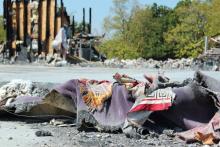
When the mosque in Joplin, Mo., on the outskirts of town burned to the ground on Aug. 6, the imam’s 4-year-old son knew what to do.
He wanted to build another.
After all, that’s what his family had done with their home after it was destroyed by the tornado that tore through the town a little more than a year earlier.
The imam's family has a new home, but the wait for a new mosque is going to take a while.
A little more than a month after the Islamic Society of Joplin mosque was destroyed by fire, the local Muslim community is moving forward with support from the interfaith community.
But progress is slow.

When inflamed mobs stormed the U.S. embassies in Libya and Egypt on Tuesday, the media quickly looked to a likely spark.
Florida Pastor Terry Jones ignited deadly riots by threatening to burn Qurans in 2010, and by torching the Islamic holy text last year. Recently, Jones said he would promote a crude film that portrays Islam’s Prophet Muhammad as a foolish sexual pervert.
But in the days before the protests, Jones made no public mention of the film — called Innocence of Muslims — even as he prepared to stage an “International Judge Muhammad Day” on Sept. 11.
Instead, the man who translated the film into Arabic, sent it to Egyptian journalists, promoted it on his website and posted it on social media was an obscure Egyptian-born Coptic Christian who lives near Washington and proudly touts his ties to Jones.

I finally sat down and watched the entire 11-plus minute video, Innocence of Muslims, which is at the heart of the recent outrage in Islamic countries in Yemen and north Africa. Suffice it to say, I lost a healthy share of brain cells in the process. The narrative – if you can call it that – is incoherent throughout, the sound is barely audible in places and the overall production values make the Annoying Orange series look like Scorsese.
That said, there’s plenty to anger Muslims in this clip, or anyone who values religious tolerance, plural coexistence, or even basic respect for human nature.

Muslim Americans condemned violence in Egypt and Libya that left four Americans dead, but remain concerned that the deaths could rekindle anti-Muslim sentiment just as post-9/11 resentment was starting to ebb.
U.S. Ambassador to Libya Christopher Stevens and three embassy workers were killed on Tuesday when fundamentalist protestors attacked the U.S. consulate in Benghazi, Libya, in response to a low-budget film that attacks Islam’s Prophet Muhammad, reportedly made by an Israeli real estate developer who lives in California.
Imam Talal Eid, the Islamic chaplain at Brandeis University near Boston and a former member of the U.S. Commission on International Religious Freedom, predicted the violence would lead to “more resentment” against Muslims, who he criticized for not doing enough against terrorism.